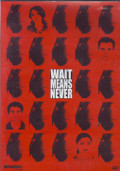
Directed by
Andrew Groves
101 minutes
Rated PG
Reviewed by
Bernard Hemingway

Wait Means Never
Synopsis: 4 young American political radicals having decided that direct action is needed in order to bring about social change kidnap the CEO of a multinational oil company. The government refuses to meet their demands however leaving them to face the consequences of their actions.Wait Means Never recalls on the one hand Costas-Gavras's State Of Seige (1973), on the other Gus Van Sant's Elephant (2003), the former for similarity of subject matter, the latter for the distantiated treatment of it. Whilst these are reference points for the viewer, Godard's films, particularly Les Carabiniers (1963) and Alphaville (1965) come to mind as more consciously-studied sources.
Much has changed in the world between 1973 and 2003, most notably the fact that, at least in the West, the Left has completely collapsed as a viable political and social alternative to right-wing values. So, for young middle-class idealists in this deadening environment desperate for social justice yet aware of the failed history of direct action since the 1960s, what is left to them but to act knowing that their actions are doomed but pretending to others and themselves that they believe they are not. Whilst within this contradiction lies the significance of their act, it is a heavy burden for the protagonists to bear, to say the least.
Director and writer Andrew Groves takes on these substantial matters with this his first feature-length film and does so very effectively, as the above-mentioned cinematic reference points indicate. His interest is not in reproducing the drama of the kidnapping and hostage situation, as was the case with Costas-Gavras, but in the describing the psychological and moral conflicts which his characters experience in the course of these events. In this respect he fills both his writer and director roles impressively and is greatly assisted by the performances of his actors. Whilst the script nicely establishes and develops the characters within the context of the events, the mixture of digicam-shot diaristic reportage and self-reflexive filmic effects works well to create both an anti-heroic treatment that depicts the everydayness and an essentialisation and abstraction that shows their extraordinariness, or in other words a credibly simultaneous account of objective and subjective perspectives, the political and the personal, the outer and inner worlds of these characters.
Here Groves is well-assisted by the casting and performances of the four principals, David Hayden-Jones as the charismatic hot-head, Tom, Rebecca Lowman as his girlfriend, increasingly unsure of her support for him, Mark Rizzo, as the intellectual fellow-traveller and Marisa Petroro as a rich girl, we might presume out for vengeance on her father. All are engaging screen presences, with Hayden-Jones very much in the Ben Affleck school of good looks and Mark Rizzo uncannily reminiscent of a young Dustin Hoffman. More pertinently, the actors are believable embodiments of their characters, bringing to bear that mixture of naturalism and sophistication which is the film's hallmark.

Want more about this film?


Want something different?




